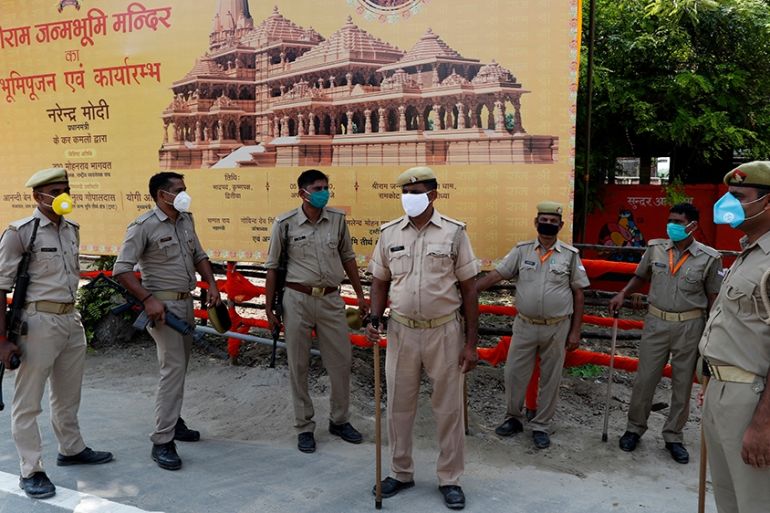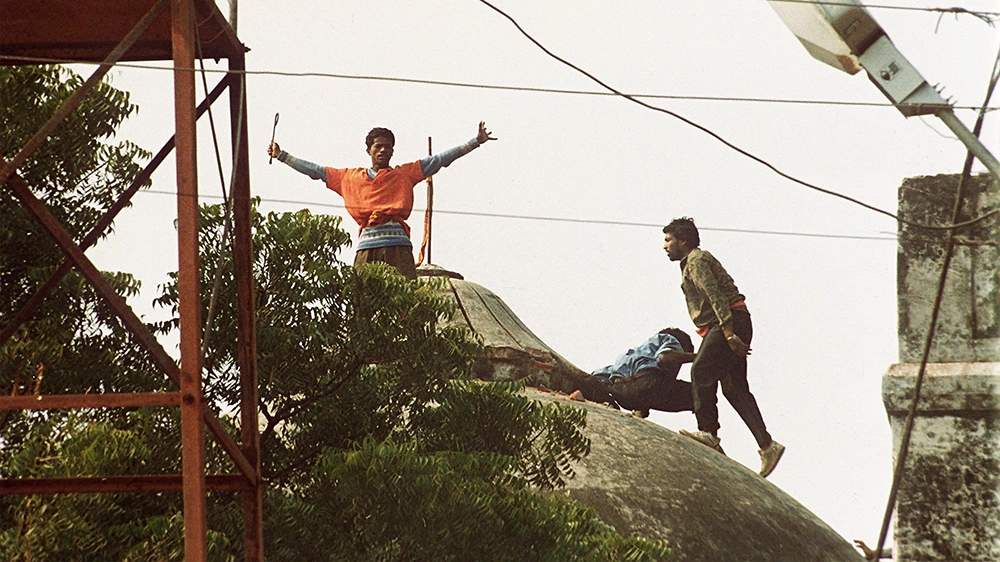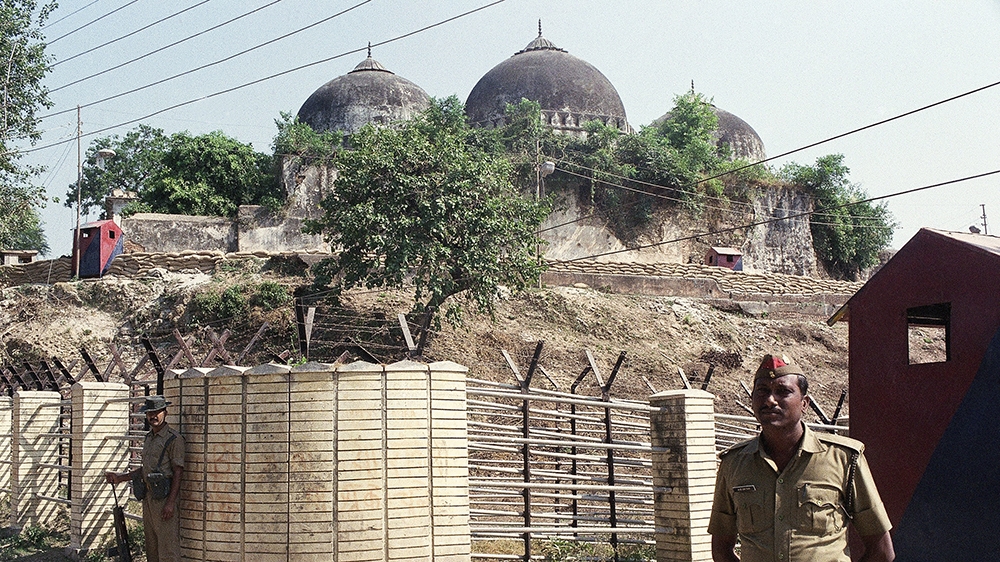As Modi launches Ram temple construction, fears of ‘new republic’
Hindu nationalist leader to launch construction of controversial temple amid fears India is losing its secularism.

Ayodhya, India – For the past week, Indian authorities have been vigorously engaged in giving Ayodhya, a small temple town in the northern state of Uttar Pradesh, a quick makeover in advance of Prime Minister Narendra Modi’s visit to lay the foundation stone for a temple to Hindu deity Ram.
The temple is being built in place of a Mughal-era mosque, which was demolished by a right-wing Hindu mob in 1992, triggering nationwide religious riots in which more than 2,000 people, most of them Muslims, were killed.
Keep reading
list of 4 itemsMuslim pupil loses UK court bid over Michaela school prayer rituals ban
Photos: Sikhs celebrate harvest festival of Baisakhi, marking new year
Masses gather for Eid celebrations in India
India’s governing Hindu nationalist Bharatiya Janata Party (BJP) rose to national prominence on the back of the temple movement launched in the 1980s.
Many Hindus believe the 16th-century Babri Masjid, named after Mughal emperor Babur (1483-1530), was built at the place where Ram was born in Ayodhya, located about 135km (84 miles) east of the state capital, Lucknow.
Last November, a decades-old protracted legal battle between the Hindu and Muslim parties ended with the Supreme Court awarding the contested site to Hindu petitioners, handing the BJP a victory to drive home its Hindu nationalist agenda.
The court asked the government to provide Muslims land at a “prominent site” within Ayodhya city limits to build a mosque.
India’s secular ethos compromised
With the inauguration of the temple scheduled for August 5 despite concerns due to the coronavirus, Modi’s BJP appears to have fulfilled a long-term promise to its core electorate.
The judgement was widely criticised for lacking a sound legal basis as well as signalling a majoritarian push that compromised on India’s secular and democratic constitutional ethics.
![[Valay Singh/Al Jazeera]](/wp-content/uploads/2020/08/5c4fe620a13344a8a63ea10920fc21ec_18.jpeg)
Ironically, the legal trial in the Babri demolition case is yet to be completed, and justice has eluded those who suffered the loss of life and properties in the nationwide violence that ensued in the wake of the destruction of the mosque – often dubbed the darkest chapter of modern India.
Modi’s government has faced both domestic and global criticism for deliberately neglecting its vast Muslim minority, numbering nearly 200 million. The Ayodhya verdict has only cemented this opinion among its opponents and critics.
The date chosen for the ceremony also coincides with the first anniversary of the abrogation of the special status of Indian-administered Kashmir, India’s only Muslim majority region that has been the theatre of a bloody armed rebellion for more than 30 years.
This aggressive posturing over issues that have dominated the BJP’s politics has raised concerns of Ayodhya-like campaigns in other places with shared Hindu-Muslim heritage and history as well.
![[Valay Singh/Al Jazeera]](/wp-content/uploads/2020/08/616fcdaf764e4f59b63c1e30b4dc4fb4_18.jpeg)
MR Shamshad, a lawyer who represented Muslim parties in the temple-mosque legal dispute, says “already there are efforts by Hindu groups to ‘reclaim’ other temples that they believe were converted into mosques”.
Supremacy of Hindus
The Vishwa Hindu Parishad, an affiliate of the Rashtriya Swayamsevak Sangh (RSS), the parent body of the BJP, has led the movement for the Ram temple since 1984.
The trust formed to oversee the construction of the temple is composed mainly of functionaries from the VHP and the RSS, which has propounded supremacy of Hindus in India.
At the moment though, the VHP has refrained from taking a clear stand on whether similar campaigns will be launched in the future.
“Right now, we are focussed on building a grand Ram temple after 500 years of struggle. Once that is over, our religious leaders and seers will decide what to do about other such places,” VHP’s regional spokesman Sharad Sharma told Al Jazeera.

Hindu population is happy
In Ayodhya, a town with a rich and diverse history, the majority Hindu population is happy the Ram temple is being constructed.
Shravan Das, a 76-year-old ascetic, says, “Now there would be a flood of development and prosperity. Millions of Hindus will come to worship here and that will be good for everyone here.”
Sitting across him, KK Nigam, who owns a shoe shop along the main road of the town, is not so certain about his future because as part of the massive infrastructure development plans, both his house and shop are at the risk of demolition for a four-lane expressway.
“I welcome the temple but the government should not destroy our lives for the sake of development. At least 2,000 people will be displaced and their livelihoods ruined if the government goes ahead with its plans,” he says, tearing up.
At Makhapur, one of the many villages that surround Ayodhya, there is an air of indifference to the hectic preparations going on in the main town.
Bhagelu Maurya, a vegetable vendor, says, “Even if the temple is built I don’t think it will affect my life. Let it get built first, we have seen promises earlier also about development but nothing happened.”
![[Valay Singh/Al Jazeera]](/wp-content/uploads/2020/08/495ce6e9e7e342de9694cf62304d6eb7_18.jpeg)
Exodus of Muslim families
A small but significant part of the town’s businesses relies on Muslim craftsmen, milk vendors and flower sellers among others.
But since the 1990s, there has been an exodus of Muslim families owing to a threat of violence in the sleepy but sensitive town by the Sarayu River.
On the day the Babri mosque was demolished, at least 24 Muslims were killed and scores of houses belonging to the community were torched, triggering the exodus that further reduced their population in Ayodhya.
Today, those who survive here are like Abid Khan who makes wooden sandals, mostly for the large number of Hindu ascetics and monks who live here.
“I have a Hindu worker who helps me, things in the town are still peaceful. But the fact is we don’t know whom to trust because we have been betrayed earlier in 1992,” says Khan.
![[Valay Singh/Al Jazeera]](/wp-content/uploads/2020/08/71cccce1a59c44298629645a75cd0467_18.jpeg)
“More than five generations of my family have lived here but with the cries for creating a Hindu India growing louder, I don’t know how long we can last here.”
His business is also going to be disrupted by the development plans but as Muslims elsewhere in India today, Khan’s concerns are more fundamental.
At a popular bangle store, the father-son duo of Haji Salim and Abdul Kalim are more circumspect but voice similar concerns. “It would have been much better if the court’s judgement was even-handed,” Kalim told Al Jazeera.
“For years now, Muslims have not bought any land in this town. In fact, they have only been selling it and leaving. If things don’t change, we too would have to decide about our future.”
![[Valay Singh/Al Jazeera]](/wp-content/uploads/2020/08/f6173b7eeb814dee8df0f1135b891cde_18.jpeg)
Harmonious co-existence
Ironically, a fact that is not talked about enough under the BJP rule is that most of Ayodhya’s temples are built on lands donated by Muslim rulers in the 18th and 19th centuries.
The town’s scores of mosques, tombs, mausoleums and graveyards are mute testaments to its rich Islamic history and is a symbol of harmonious co-existence between Hindus and Muslims.
There has been a marked absence of Islamic places of worship in the nearly $300m development plan for the town.
Anil Singh, an Ayodhya-based writer, sees this as part of the Hindu right wing’s scheme to obliterate the town’s syncretic past. “Go a little deeper into Ayodhya and you see so much of Hindu-Muslim heritage,” he says.
“Hindus here worship at Sufi shrines like that of Badi Bua who is considered to be the town’s patron saint. But, you won’t hear about her tomb in the government’s plans.”
The neglect of Muslims is palpable in the village where the provincial BJP government has allotted land for the mosque under the Supreme Court’s verdict.
While the local administration has left no stone unturned to ensure the foundation stone of Ram temple is laid even during a pandemic, it has not shown the same vigour to kick-start the construction of the new mosque. A veritable gloom pervades Dhannipur village.
A few residents who spoke to Al Jazeera expressed displeasure that the government had not consulted them before deciding to allocate land for the mosque in their village.
“We don’t want any trouble here and the Supreme Court asked the mosque to be built on land inside Ayodhya, not here which is about 20km from there,” Mohammad Zubair told Al Jazeera.
Over the last few years, an unprecedented sense of alienation and fear has gripped India’s minorities, particularly the Muslims.
“The BJP has been reorganising the Indian polity as an authoritarian Hindu nationalist state. Politically, three events – the Ayodhya verdict, revocation of Kashmir’s special status and statehood, and the Citizenship Amendment Act – challenged the core foundations of the Indian republic,” political scientist Zoya Hasan told Al Jazeera.
“The ceremony in Ayodhya openly involving state machinery is a sobering moment, marking the dismantling of the original republic and a signpost of the commencement of a new republic.”
